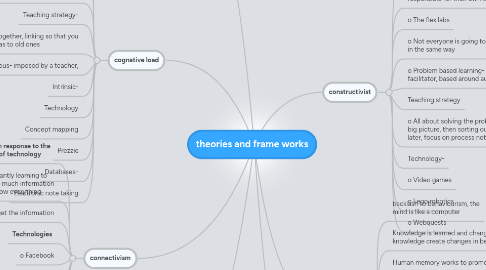theories and frame works
by kyle larsen


1. connectivism
1.1. developed in response to the rapid onset of technology
1.2. Professionals must be constantly learning to keep current, and there is so much information that no one person could know everything
1.3. Know where to go to get the information
1.4. Technologies
1.5. o Facebook
1.6. o Google searches
1.7. o Wikipedia
1.8. o Instagram
1.9. o Bookmarking apps (pintrest)
1.10. Can now expand our connections way greater than ever before
2. cognative load
2.1. The idea that we can over or under stimulate the brain, through this learning cant occur because the balance isn’t there
2.2. Cant learn if memory is overloaded
2.3. Only have so much capacity in the mind at any given time
2.4. Teaching strategy-
2.5. Connect lessons together, linking so that you can relate new ideas to old ones
2.6. Extraneous- imposed by a teacher,
2.7. Intrinsic-
2.8. Technology
2.9. Concept mapping
2.10. Prezzie
2.11. Databases-
2.12. Electronic note taking
3. behaviourism
3.1. Brain is a blank slate
3.2. Don’t really know what goes on in the brain, but with a stimulus, goes into our brain and pops out as information/learning
3.3. Learn from external stimulas
3.4. Positive reinforcement-
3.5. Teaching strategy- finding the best way to shape wanted/ unwanted behaviour,
3.6. o Repeating behaviour
3.7. o Math blaster
3.8. o Iclicker-
3.9. o Computer assisted instruction
3.10. o Online tutorial-instruction orientated, step by step, learn in a linear fashion
3.11. Key ideas
3.12. o Molding
3.13. o Drill and practice
4. philopsophy of teachnology
4.1. teachers that dont use technology may be replaced by those that do
4.2. must learn to instruct students to use relavant technology that they will have access to and need to understand how to use in the future
4.3. assess how a teacher may use technology in their class
4.4. must train all facets of technology to themselves and students- in class, online, etc
5. cognitivism
5.1. backlash to behaviourism, the mind is like a computer
5.2. Knowledge is learned and changes in knowledge create changes in behaviour
5.3. Human memory works to promote learning
5.4. Schema- constanty building on a scaffold that we already have
5.5. Three kinds of memory
5.6. Sensory- how we take information in
5.7. Short term/working memory- complex and holds on to all kinds of things, if you keep using it it enters longterm memory
5.8. Long term memory-
6. constructivist
6.1. Personal experience has a lot to do with how you learn
6.2. Its about students building and being responsible for their own learning
6.3. o The flex labs
6.4. o Not everyone is going to learn the same thing in the same way
6.5. o Problem based learning- teacher is a facilitator, based around authentic tasks
6.6. Teaching strategy
6.7. o All about solving the problem, looking at the big picture, then sorting out the smaller parts later, focus on process not end result
6.8. Technology-
6.9. o Video games
6.10. o Lego robotics
6.11. o Webquests
7. tpack
7.1. Involve three kinds of knowledge
7.1.1. technology
7.1.2. content
7.1.3. pedagogy
